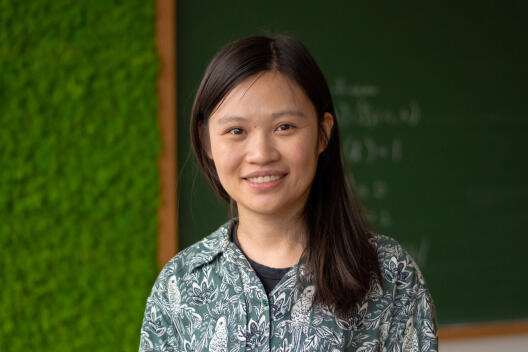Interview with Dr. Tingxiang Zou

Tingxiang Zou is a postdoc at Mathematics Münster. She specialises in model theory.
What is your research area and which scientific question are you currently working on?
I am working on a branch of pure mathematics, called model theory. Unlike most other areas of mathematics, model theory doesn't have specific mathematical objects to study, it is rather a tool that is built on logic and has been developed during the past few decades. In some sense it provides fresh perspective and new tools to approach existing mathematical problems. I am currently working on further developing a tool that is based on counting points asymptotically on finite structures and am trying to apply this tool to solve specific questions.
As I am doing pure mathematics, my research findings most probably wouldn't benefit anyone outside the mathematics community. But I believe mathematics justifies its own existence and doesn't have to rely on applications. Of course being one of the key tools for lots of other natural and social sciences is one of the most beautiful aspects of mathematics.
Have you always wanted to become a mathematician and researcher?
I didn't start with mathematics in the beginning. I was more into philosophy and sociology when I started my undergraduate study. In fact I wouldn't imagine I would become a mathematician. Back then I was fascinated by understanding how human cognition works, or rather what are the constraints of it. In order to understand this problem also from natural sciences perspectives, I started to take some basic mathematics courses and have been trapped in mathematics since then.
At which institutions did you do your studies and further research stays?
I did my undergraduate study at the Peking University in China and master degree at the University of Amsterdam, followed by PhD study at the University of Lyon and a one-year postdoc at the Hebrew University of Jerusalem before I came to Münster.
What were the most important moments in your career so far?
Looking back, what supports me most in my career is the supporting and cooperative studying and working environment. The patience and humbleness from most mathematicians I have met have helped and encouraged me a great deal.
What are the most beautiful aspects about being a mathematician and a researcher for you?
I guess the most valuable part for myself is that it gives me a feeling that I am doing something on a solid ground, something that is simply there and has a relatively weak connection with no-matter-who's ego.
Which were the reasons for you to come to join Mathematics Münster?
Münster has a quite large model theory group. I knew researchers here since I was a graduate student, as I participated in and have benefited a great deal from the spring semester held in Münster back then which was aimed at bringing all graduate students and young postdocs in model theory together. Further connections with the model theory group here were made during my PhD study and I always wanted to work with them. The Cluster is providing us a very supportive and amiable working environment.
You have started at the University of Münster during the Corona pandemic: Which challenges did you have to overcome to come to Münster?
As I moved to Münster with my daughter, the Cluster and the university have already helped me a great deal with child-caring and all related things. With this smooth start, I expect to spend a productive and enjoyable time with my daughter here. However, I don't quite understand why the banks, the insurance companies and government departments like city halls and foreigners offices insist on communicating by post. It makes me anxious that I would miss important letters.
The difficulties of starting during the pandemic for me are mainly the lack of social and academic interaction in person and insufficient working time due to the reduced functioning of child-care. The latter is manageable as kindergartens in Münster have already done their best to keep operating as much as possible and I am very grateful to that. On the other hand, most seminars and conferences around the world have been moved online and we get more access to these resources. I benefit quite a lot from participating in online courses and seminars that I am interested in.

